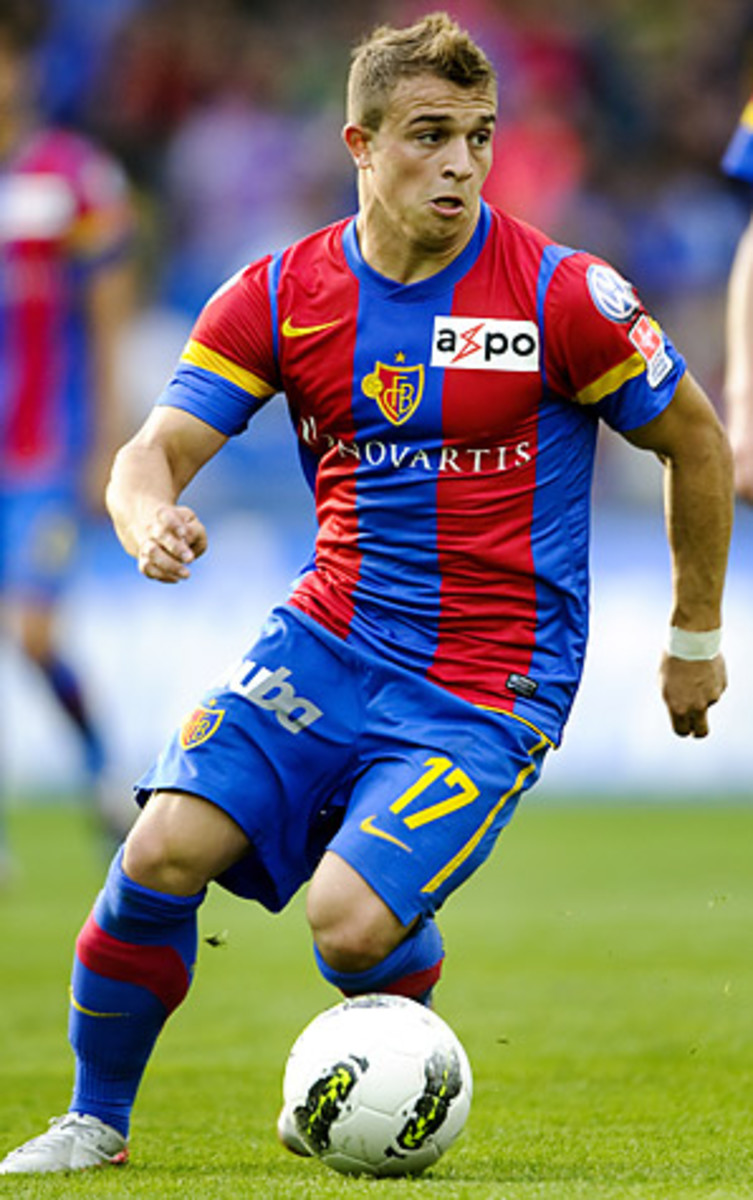Bayern's capture of Shaqiri a coup


FC Bayern Munich has been following Xherdan Shaqiri's progress keenly since September 2010, when the Swiss winger's raw ability was noticed in two Champions League meetings with FC Basel at the age of 18. "If Bayern was to call, I wouldn't have to think too long," Shaqiri said at the time, in response to Swiss media speculation that the Germans were interested to secure his services. Bayern kept tabs on the player and asked Basel keep the lines of communication open. "The name Shaqiri is anything but new to us," Bayern president Uli Hoeneß told Zurich-based Tagesanzeiger last year. In Swiss papers, a bid had been speculated throughout last season and again in the summer, so there was little surprise when an agreement was finally announced last week. Despite this sense of inevitability, it still took a number of coincidental as well as interrelated developments to bring the €11.6 million ($15.1M) deal to fruition.
Firstly, it's important to note that this transfer only happened because of an even bigger non-transfer. Borussia Mönchengladbach's shooting-star Marco Reus was initially earmarked as the "third man" behind Bayern attacking wide players Arjen Robben and Franck Ribéry for next season. But the 22-year-old Reus turned down Bayern's offer at the end of December to sign for champion Borussia Dortmund instead. Losing out on their preferred target in such a public fashion reflected badly on the Bavarian giants and put pressure on the hierarchy at Säbenerstrasse to come up with an alternative solution double-quick.
A move for Shaqiri in the winter break was mooted, but fairly quickly dismissed as "too early" by Shaqiri's camp and Basel. Then something quite unusual happened. Faced with concrete offers from Galatasary and Zenit St. Petersburg for the player, Basel turned to Bayern and asked it to make its mind up. "We got in contact and looked for a decision," Basel president Bernhard Heusler revealed in a press conference last week. Sporting director Christian Nerlinger did not take long to say yes. Wages were not much an issue, either. Shaqiri signed a four-year-deal that will (initially) be worth around €2M ($2.6M) per season.
Basel's cooperative behavior in this case and the relatively modest transfer fee appear curious, but can be both explained. Relations between the two "FCB"s have long been more than cordial. Basel has often referred to Bayern as its "big brother" and to extent modeled itself on the Germans. Heusler has worked closely with Bayern CEO Karl-Heinz Rummenigge in the European Clubs Association (ECA) over a number of years; the two men are considered friends. The hiring of former Bayern midfielder Thorsten Fink as manager in 2009 intensified the contact, while an additional line of communication existed thanks to ex-Bayer manager Ottmar Hitzfeld's tenure as Swiss national manager. What's more, Fink's successor Heiko Vogel used to work as a Bayern youth coach. Vogel admitted to being quizzed about Shaqiri's qualities by Bayern officials, as was Hitzfeld. Both agreed that the son of refugees from Kosovo had what it takes to make it in the Allianz Arena.
By themselves, the good relations could not account for a price that smacks of a bargain. For Bayern, paying significantly less than the €17.1M ($22M) Dortmund shelled out on Reus was naturally an attractive proposition, and for Basel, there were obvious benefits, too. Without any other offers that were acceptable to the player -- "I wanted to go to country where I could communicate," Shaqiri said about his refusal to entertain a move to Turkey or Russia -- Basel would have had to wait until the end of season in order to create an auction with an uncertain outcome. Privately, the club were surprised that none of the big Premier League clubs ever tested its resolve with a firm bid, especially in the light of Shaqiri's strong showing in Switzerland's 2-2 draw with England at Wembley last summer. Thus, the decision was taken to cash in now. It was a case of "better a bird in the hand than in two in the bush."
Bayern, on the other hand, felt that it could steal a march on other clubs by making a move now. Shaqiri's appearances in the Champions League in the next couple of weeks -- ironically against FC Bayern -- might have well intensified interest in him again.
The ability to present the first new signing for 2012/13 now, also conveniently served to douse some ill-feeling after a spectacularly ill-advised marketing stunt had fooled Bayern supporters into believing that a significant new recruitment had been secured two weeks earlier. (Said "new star" was revealed as a new Facebook application). Shaqiri's transfer also shows that Bayern essentially agreed with Ribéry's recent criticism that the squad was lacking in depth ("the second team is not strong enough"). Thirdly, it has come at a good time, as far as dressing room politics are concerned. Contrary to some reports, the tricky, instinctive winger has not been bought as a replacement for Arjen Robben. But his imminent arrival certainly helps Bayern in the current contract extension negotiations with the Dutchman, who has found himself starting from the bench in recent games. Robben appears a little less irreplaceable right now, and Bayern hope that this slight loss of status will make finding an agreement easier.
Hitzfeld recommended "Shaq," as the Swiss fans call him, as an "extraordinary talent and very adaptable person that could play in any top team." There have been one or two questions about his professionalism in the past, but Bayern is confident it can help the player fulfill his potential. Shaqiri, 5-foot-6 tall and somewhat stocky, described himself as "polyvalent" -- multitalented. His favorite position is on the right side of midfield, but he's equally at home on the left or as a deep striker. The "Kraftwürfel" (BLICK) (power cube) can also double-up as a fullback -- a significant advantage in the light of Bayern's continued problems on the right defensive side.
